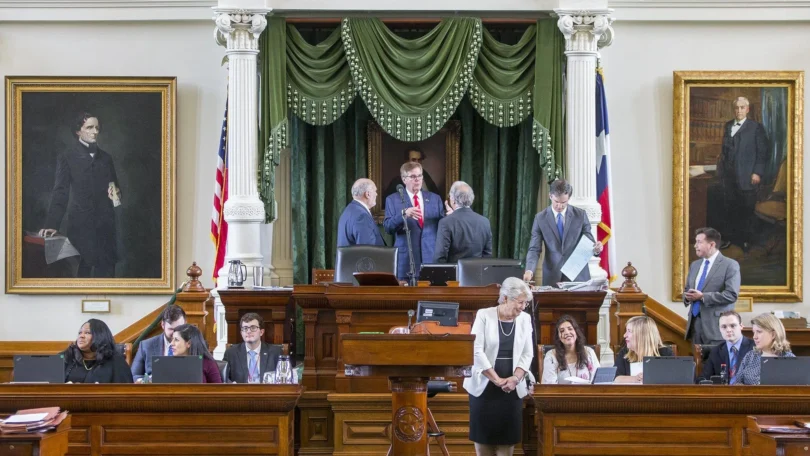Is Sports Betting Legal in Texas? Everything You Need to Know
Sports betting in Texas is still not legal. Texas remains one of the few U.S. states where betting is prohibited. Are changes in the law on the horizon?

Understanding Texas Sports Betting Laws
Despite several bills introduced over the past few years aiming to legalize sports betting, lawmakers have not shown favor towards such initiatives. As a result, sports betting—both retail and online—remains illegal in Texas. But how has this issue evolved over the years?
Historical Context
Sports betting has been illegal in Texas since 1937. After a brief four-year period of legalization intended to provide relief during the Great Depression, this form of gambling was once again outlawed.
Since then, the legal status of sports betting in Texas has periodically resurfaced. Legislative efforts were made several times between the 1960s and 1980s, spearheaded by Virgil “Red” Berry, but without the desired outcome.
Although a referendum in 1987 led to the creation of the Texas Racing Commission and the legalization of pari-mutuel betting, the prospect of legal sports betting remained distant.

Current Legal Framework
Currently, the issue of sports betting in Texas remains in limbo. Despite vocal support from influential figures in the sports world, the state has shown little interest in legalization.
This is partly due to strong opposition from the Republican governor of Texas, who deems any expansion of gambling opportunities unacceptable.
Even clear research findings have not helped the cause. For instance, a study published in November 2024 by Eilers & Krejcik indicated that Texas Sports Betting: Legalization Could Create 8,000 Jobs
Exceptions to the Rule
Despite the status of sports betting, betting on horse racing is legal in Texas. However, Texans will encounter certain limitations, as bets can only be placed in person at racetracks.
Additionally, fantasy sports betting sites like PrizePicks, OwnersBox, and ParlayPlay operate in Texas and are a popular alternative to sports betting. The success of these platforms highlights weaknesses in current regulations, which are leveraged by fantasy platforms popular among players who cannot enjoy legal sports betting.
Recent Developments in Texas Sports Betting
- [November 13, 2025]: Texas Gambling Legalization Faces Uphill Fight After Political Setbacks
- [November 5, 2025]: Casino Debate Dominates Texas Senate Special Election Funding
- [May 22, 2025]: Texas Senate Axes Lottery Commission with Unanimous Vote
Online Sports Betting in Texas
Just like retail sports betting, online sports betting remains illegal in Texas, even though more states are choosing to legalize this sector and benefit from taxes paid by operators.
Undoubtedly, this is not an ideal situation for players or, in the long run, for the state, especially considering that the wave of online sports betting legalization is spreading further across the country after the fall of PASPA.
Impact of Offshore Betting Sites
The current legal status benefits not only DFS operators but also illegal offshore operators who try to entice players deprived of legal betting options.
It’s important to remember that using offshore operators’ services always carries risks, as these companies have never had to meet the stringent requirements of a specific state to operate legally.
- Risks to Players: They pose a threat to unsuspecting players who often lack proper control over their gambling.
- Economic Impact: They harm the state and the potential market that could be launched in the future.
Attempts to Legalize Sports Betting in Texas
Legislative efforts continue, and the topic of legalization has resurfaced in recent years.
In 2019, Representative Eddie Lucio III introduced bill HB 1275, aiming to regulate sports betting, but the bill failed.
Two years later several bills (SB 736, SJR 39, and HB 2070) were introduced to legalize online and retail sports betting. None passed the committee stage.
In 2023, two more bills (HB 1942 and SB 715) sought to pave the way for a statewide referendum, placing the decision in the hands of Texas residents.

HJR 102, a resolution proposing a constitutional amendment to put sports betting legalization to a vote in November, passed the House of Representatives with a vote of 100-43. However, Lieutenant Governor Dan Patrick used his powers to block the resolution and bills from a Senate vote, stating they lacked sufficient support.
Despite growing support for legalizing sports betting in Texas, strong opposition from conservative lawmakers and religious groups poses a significant challenge. The next opportunity to revisit this topic will be during the 2025 legislative session.
Economic Considerations
Proponents of legal sports betting in Texas frequently cite the argument of increased revenues to the state budget. A recent study by Eilers & Krejcik mentions an additional $360 million annually. Certainly, this is an amount that’s hard to ignore.
The same study also supports another argument from proponents, suggesting that legal changes would allow for the creation of 8,000 jobs in the state and contribute to overall economic growth, bringing in an additional $2.6 billion.
It would also help limit the reach of the black market, which exploits the current legal situation and poses a threat to bettors using such sites.
Legalization would also be an opportunity for professional teams like the Dallas Cowboys and Texas Rangers, which could financially benefit from partnerships with legal bookmakers.
Public Opinion
During the legislative session in 2021, a survey showed that 43% of Texas residents support the legalization of sports betting, and another 31% have no opinion on the matter. Only 26% of respondents were decidedly opposed to legalization. Interestingly, these results were consistent across political party lines.
Owners of sports teams, such as Neil Leibman of the Texas Rangers and Charlotte Jones of the Dallas Cowboys, have publicly supported legalization, arguing that it’s a matter of freedom of choice and an opportunity for economic development.
Despite growing public support, opponents of legalization still have a strong voice in Texas. Baptist churches and other religious groups traditionally oppose gambling, arguing that it leads to addiction and social problems.
The Future of Sports Betting in Texas
The future of sports betting in Texas appears as a mix of uncertainty and enormous untapped potential. On one hand, the conservative nature of the state and strong opposition from certain groups, including influential Baptist churches, pose a serious obstacle to legalization.
On the other hand, growing public support, economic arguments, and the involvement of prominent figures, such as former governors and sports team owners, indicate increasing pressure to change the law.
The most probable scenario in the short term is the maintenance of the current ban. Conservative politicians will likely continue to block legalization until economic and social pressure becomes too strong to ignore.
It’s possible that Texas will gradually liberalize the law, for example, by legalizing sports betting only in specific locations, such as tribal casinos or sports stadiums.
In the long term, full legalization of sports betting, both online and retail, is a real possibility. If economic and social pressure continues to grow and other states continue to succeed with legalization, Texas may ultimately decide to follow the same path.
The next chance to legalize sports betting in Texas will arise during the legislative session in 2025. The Texas Legislature meets every two years, and the last session in 2023 concluded without a breakthrough on legalization.
How to Bet on Sports Legally in Texas
As of today, sports betting in Texas is illegal. There are no venues in the state where you can legally place sports bets. Websites and apps offering sports betting in Texas operate illegally, and using them carries risks.
Texas does have two tribal casinos that offer only electronic games, not sports betting.
Alternative Forms of Legal Gambling
Despite the lack of legal sports betting, other forms of gambling are available in Texas. The Texas Lottery offers various games, including scratch-offs and drawings, as well as tickets for multi-state lotteries like Mega Millions and Powerball.
Betting on horse racing is legal at three racetracks in Texas:
- Retama Park
- Sam Houston Race Park
- Lone Star Park
Poker clubs operate in Texas by charging membership and time fees instead of taking a rake from the pot. However, the legality of these clubs is contested.
In Texas, Daily Fantasy Sports (DFS) platforms like DraftKings and FanDuel operate, offering fantasy bets on sports outcomes.
DFS Platforms Operating in Texas
In Texas, Daily Fantasy Sports (DFS) operate in a legal gray area. They have not been formally legalized, but there are no regulations that explicitly prohibit them. As a result, many DFS platforms operate in Texas without hindrance.

Among the popular DFS platforms in Texas are:
- DraftKings: One of the market leaders in DFS, DraftKings returned to Texas in 2018 after previously withdrawing due to legal uncertainty. It offers a wide range of contests and prize pools.
- FanDuel: Similar to DraftKings, FanDuel is one of the largest players in the DFS market. Known for high-quality products and attractive bonuses for new users.
- PrizePicks: This platform offers a simple betting format where users choose “more” or “less” for specific player statistics. PrizePicks is popular for its ease of use.
- Underdog Fantasy: Underdog stands out with “best ball” contests, where users draft teams, and the app automatically selects the highest-scoring players for the lineup.
- Sleeper: Sleeper offers “pick’em” contests with real-money payouts. It differs from other platforms by focusing on longer contests, lasting even an entire season.
- Betr: Betr gained popularity thanks to “more or less” games, comparable to “over/under” bets, and multi-pick contests similar to accumulator bets.
It’s also worth mentioning DraftKings Pick6, a new variant of the DFS platform launched in December 2023. In DraftKings Pick6, users combine two to six player stat lines, choosing whether a player will score more or less points. The “pick set” system allows for a win even if not all picks are correct.
Can I bet on sports online if I live in Texas?
No, online sports betting is illegal in Texas. Using offshore sites is risky and not recommended.
What are the penalties for illegal sports betting in Texas?
Penalties can include fines and even criminal charges, depending on the severity of the offense.
Are daily fantasy sports legal in Texas?
Yes, daily fantasy sports are currently legal, although they have faced legal challenges in the past.
How does Texas compare to other states regarding sports betting laws?
Texas has some of the strictest gambling laws, lagging behind many states that have legalized sports betting post-PASPA.
Legislative efforts and shifting public opinion suggest that change could be on the horizon. Until then, Texans interested in sports wagering should stay informed about legal developments and explore alternative legal options like daily fantasy sports or horse racing.
Recommended

